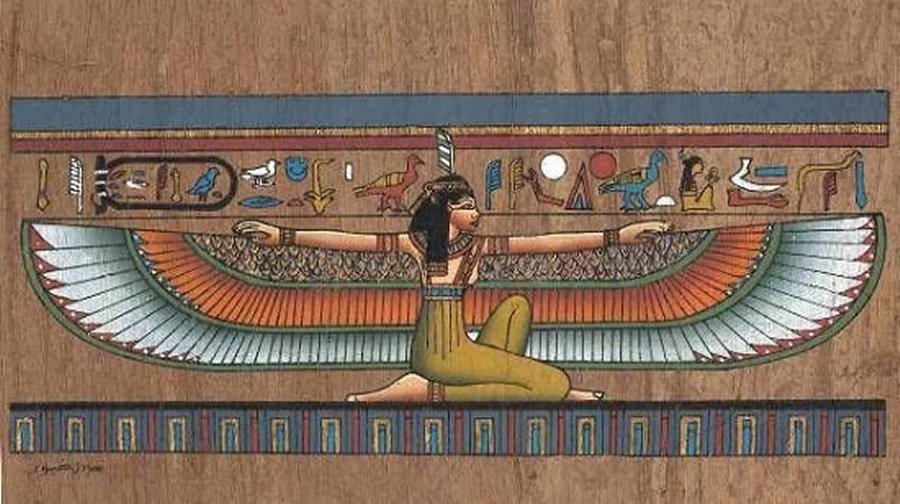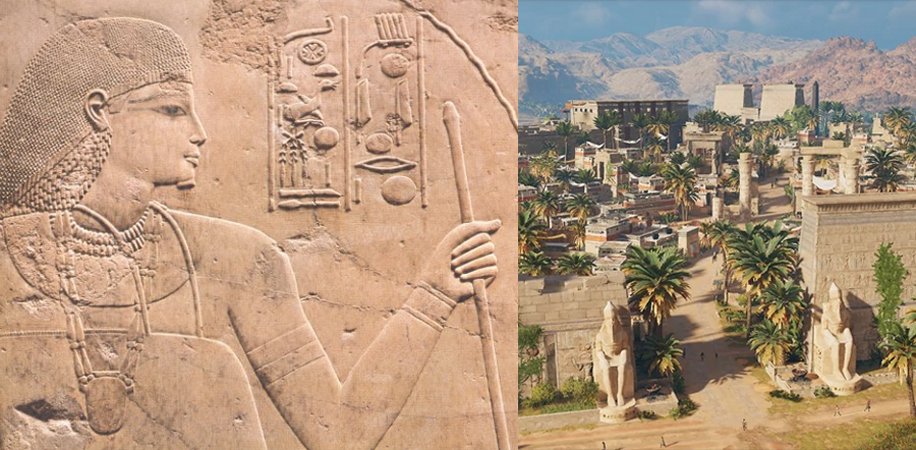Why Did Ancient Egyptians Fear The Vizier?
Ellen Lloyd - AncientPages.com - One would think twice before committing crimes in ancient Egypt. The punishments for breaking the law were severe and, in some cases, fatal.
Ancient Egyptians had many laws, and those who dared to interfere with the Cosmic Order – Maat had to pay a high price, but not with money. No person stood above the law. No one was special and could be allowed to misbehave.
Maat – Ancient Egypt’s Most Important Religious Concept - read more
Powerful nobles and officials could be punished just as quickly as farmers and pyramid builders.
Depending on the type of crime, a person risked drowning, mutilation, decapitation, or being burned alive.
Maat - The Cosmic Order Must Be Maintained
The Pharaoh was responsible for maintaining the Maat System, and this subject we discussed earlier on Ancient Pages.
Maat represented the essential religious concept of the Egyptian view of the world. It was a concept of order in the world that the gods, pharaohs, and ordinary people had to obey.
Maat was the Harmony or Law of the Universe. The lack of Maat and her departure meant an inevitable return to the original chaos (Nu) and the end of the known world.
Every Egyptian was responsible for maintaining the Cosmic Order.
The Vizier Was Respected And Feared
Next, after the Pharaoh, the vizier was the most influential person in ancient Egypt. As the highest state official, the vizier was the immediate subordinate of the king, responsible for legal matters, and thus feared by criminals.
The Pharaoh appointed the vizier, and he was usually one of the king's younger brothers. The duties of the vizier were defined in the Instruction of Rekhmire (Installation of the Vizier), a New Kingdom text.
All other lesser supervisors and officials, such as tax collectors and scribes, would report to the vizier. The vizier supervised Pharaoh's security guards and all soldiers who protected temples and palaces.
Left: Ramose was the Mayor of Thebes and Vizier of Upper Egypt during the later part of the reign of Amenhotep III and the early part of the reign of Amenhotep IV, who later became Akhenaten. - Credit: donf.com - Right: Artistic impression of Thebes - Credit: XOdeyssusx
The vizier was very powerful and appointed judges. The vizier was the one who defined the punishment for a serious crime. The vizier likely consulted the king concerning all difficult decisions. No one could receive a death sentence in ancient Egypt without the Pharaoh's express permission. The vizier was also not allowed to judge an official based on suspicion and charges without hearing his defense.
The worst prison in ancient Egypt was located in Thebes. Known as the Great Prison, this place served as a confinement and labor camp. In his book Duties of the Vizier, author G. P. F. Van Den Boorn writes, "its inmates included convicted criminals, people awaiting execution for capital crimes and corvée laborers." Statute labor is a corvée imposed by a state for public works. The last-mentioned were unpaid workers.
Ancient Egyptians were highly harsh when they discovered someone had interfered with the Maat system. Anyone who broke the law in Egypt feared the vizier, with good reason.
During the Fifth Dynasty (2,500 B.C. – 2,350 B.C.), Egyptian Vizier Ptahhotep, occasionally known as Ptahhotep I, Ptahhotpe, or Ptah-Hotep, wrote several instructions based on his wisdom and experiences.
His precious text contains advice on how to live your life, and much of what he wrote is still highly relevant today.
The Maxims of Ptahhotep influenced later philosophical works, and his work is one of the first Egyptian books.
Written by Ellen Lloyd – AncientPages.com
Updated on December 1, 2023
Copyright © AncientPages.com All rights reserved. This material may not be published, broadcast, rewritten or redistributed in whole or part without the express written permission of AncientPages.com
Expand for referencesMore From Ancient Pages
-
 Longvek – Ancient Historical City That Sheds Light On Cambodia’s ‘Dark Age’
Archaeology | Jan 13, 2016
Longvek – Ancient Historical City That Sheds Light On Cambodia’s ‘Dark Age’
Archaeology | Jan 13, 2016 -
 Famous Viking Warrior Eric “Bloodaxe” Haraldsson: King Of Norway
Featured Stories | Sep 29, 2016
Famous Viking Warrior Eric “Bloodaxe” Haraldsson: King Of Norway
Featured Stories | Sep 29, 2016 -
 ‘Viking Disease’ Hand Disorder May Come From Neanderthal Genes
Archaeology | Jun 14, 2023
‘Viking Disease’ Hand Disorder May Come From Neanderthal Genes
Archaeology | Jun 14, 2023 -
 Why Do Some Cities Only Last A Century While Others Prosper For A Thousand Years Or More?
Archaeology | Mar 6, 2023
Why Do Some Cities Only Last A Century While Others Prosper For A Thousand Years Or More?
Archaeology | Mar 6, 2023 -
 Teeth Pendants And Prominent Status Of Elks In Stone Age – New Study
Artifacts | Jan 15, 2021
Teeth Pendants And Prominent Status Of Elks In Stone Age – New Study
Artifacts | Jan 15, 2021 -
 Calakmul Was Powerful Ancient Maya Seat Of The Snake Kingdom
Featured Stories | Apr 15, 2019
Calakmul Was Powerful Ancient Maya Seat Of The Snake Kingdom
Featured Stories | Apr 15, 2019 -
 11th-Century Pratihara-Era Temple Accidentally Found By A Farmer In Uttar Pradesh, India
Archaeology | Aug 6, 2020
11th-Century Pratihara-Era Temple Accidentally Found By A Farmer In Uttar Pradesh, India
Archaeology | Aug 6, 2020 -
 Oldest Preserved Remains Of Bed Bug Found In Paisley Caves, Oregon
Archaeology | Apr 7, 2017
Oldest Preserved Remains Of Bed Bug Found In Paisley Caves, Oregon
Archaeology | Apr 7, 2017 -
 Hill Of 100,000 Crosses In Lithuania Survived Against All Odds
Featured Stories | May 23, 2017
Hill Of 100,000 Crosses In Lithuania Survived Against All Odds
Featured Stories | May 23, 2017 -
 Dropa Stones: Did A 12,000 Year-Old Extraterrestrial Spaceship Crash On Earth?
Featured Stories | Oct 2, 2015
Dropa Stones: Did A 12,000 Year-Old Extraterrestrial Spaceship Crash On Earth?
Featured Stories | Oct 2, 2015 -
 Rare Six-Foot-Tall Female Statue Accidentally Unearthed By Mexican Farmers
Artifacts | Jan 10, 2021
Rare Six-Foot-Tall Female Statue Accidentally Unearthed By Mexican Farmers
Artifacts | Jan 10, 2021 -
 Prehistoric Puzzle: Three Gigantic Stone Heads Of Unknown Origin
Featured Stories | Mar 17, 2020
Prehistoric Puzzle: Three Gigantic Stone Heads Of Unknown Origin
Featured Stories | Mar 17, 2020 -
 Opium Residue Discovered In 3,500-Year-Old Pottery Offers Evidence The Drug Was Used In Ancient Burial Rituals
Archaeology | Sep 20, 2022
Opium Residue Discovered In 3,500-Year-Old Pottery Offers Evidence The Drug Was Used In Ancient Burial Rituals
Archaeology | Sep 20, 2022 -
 Large 3,400-Year-Old Mittani Empire-Era City Emerges From The Tigris River In Iraq
Archaeology | May 30, 2022
Large 3,400-Year-Old Mittani Empire-Era City Emerges From The Tigris River In Iraq
Archaeology | May 30, 2022 -
 Prehistoric Artwork In Chauvet-Pont d’Arc Cave 10000 Years Older Than Previously Thought
Archaeology | Apr 12, 2016
Prehistoric Artwork In Chauvet-Pont d’Arc Cave 10000 Years Older Than Previously Thought
Archaeology | Apr 12, 2016 -
 Roman Marble Head Found In Lake Nemi Could Be From Caligula’s Legendary Ships
Archaeology | Jun 28, 2023
Roman Marble Head Found In Lake Nemi Could Be From Caligula’s Legendary Ships
Archaeology | Jun 28, 2023 -
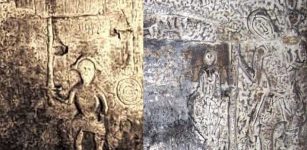 Mysterious Royston Cave And Its Unexplained Carvings Still Puzzle Scientists
Featured Stories | Jan 11, 2014
Mysterious Royston Cave And Its Unexplained Carvings Still Puzzle Scientists
Featured Stories | Jan 11, 2014 -
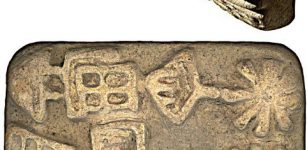 Royal Inscription Of Naram-Sîn Of Akkad: The First Ancient King To Use Blocks For Printing Bricks
Artifacts | Jul 28, 2016
Royal Inscription Of Naram-Sîn Of Akkad: The First Ancient King To Use Blocks For Printing Bricks
Artifacts | Jul 28, 2016 -
 Bees Originated From An Ancient Supercontinent Millions Of Years Earlier Than Previously Thought
Evolution | Jul 31, 2023
Bees Originated From An Ancient Supercontinent Millions Of Years Earlier Than Previously Thought
Evolution | Jul 31, 2023 -
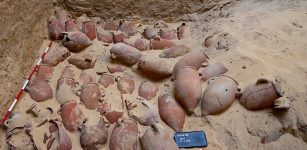 Largest Ancient Embalming Cachette Ever Found Unearthed At Abusir, Egypt
Archaeology | Feb 20, 2022
Largest Ancient Embalming Cachette Ever Found Unearthed At Abusir, Egypt
Archaeology | Feb 20, 2022

